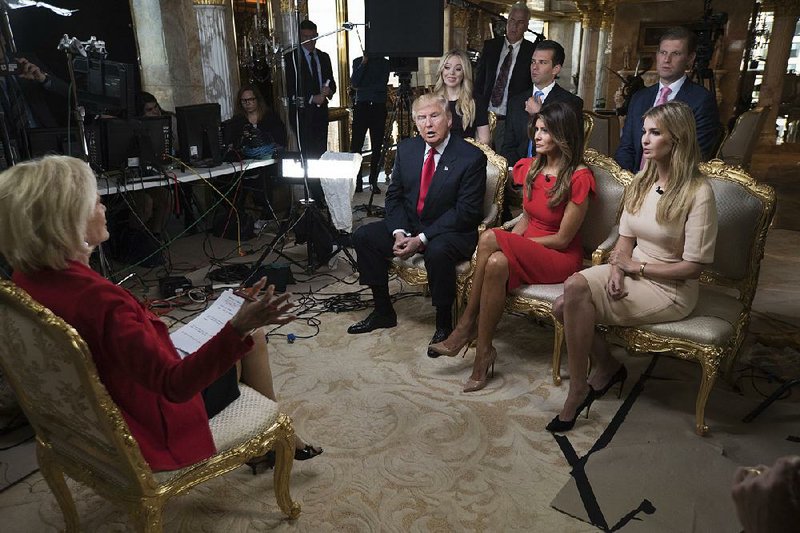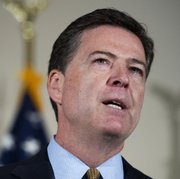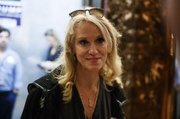In a 60 Minutes interview set to air today, President-elect Donald Trump shifts his position on the Patient Protection and Affordable Care Act, saying he would try to preserve key parts of it and praising Hillary Clinton as "very strong and very smart."

Seated with his wife, Melania, and his four adult children, Trump spoke to 60 Minutes correspondent Lesley Stahl in his first televised interview since winning the election last week.
Trump tells Stahl that Clinton's phone call conceding the election was "lovely" and acknowledges that making the phone call was likely "tougher for her than it would have been for me," according to previews of the interview released by CBS.
"She couldn't have been nicer. She just said, 'Congratulations, Donald, well done,'" Trump tells Stahl. "And I said, 'I want to thank you very much. You were a great competitor.' She is very strong and very smart."
Trump's tone in the interview was in sharp contrast to his bitter attacks on the campaign trail, in which he called Clinton "Crooked Hillary" and encouraged chants of "Lock her up!" at his rallies. Trump also referred to his competitor as "the devil," "a bigot" and -- at the end of the final presidential debate -- "such a nasty woman."
[INTERACTIVE TIMELINE: Donald Trump’s life, business career, politics]
Trump also tells Stahl that former President Bill Clinton called him the next day and "couldn't have been more gracious."
"He said it was an amazing run -- one of the most amazing he's ever seen," Trump said. "He was very, very, really, very nice."
During the campaign, Trump had tried to use Bill Clinton's infidelities as a way to attack and embarrass Hillary Clinton. For the second presidential debate, Trump had sought to intimidate his competitor by inviting women who had accused the former president of sexual abuse to sit in the Trump family box. Debate officials quashed the idea.
[INTERACTIVE: 2016 election coverage]
In the interview with Stahl, Trump does not rule out calling both of the Clintons for advice during his term.
"I mean, this is a very talented family," he said. "Certainly, I would certainly think about that."
Trump also reiterates on 60 Minutes that he may keep portions of the Affordable Care Act, something he had mentioned he might do after meeting with President Barack Obama in the White House on Thursday.
When Stahl asks whether people with pre-existing conditions would still be covered if Trump repeals and replaces the Affordable Care Act, Trump said they would "because it happens to be one of the strongest assets."
"Also, with the children living with their parents for an extended period, we're going to ... very much try and keep that," Trump added, referring to portions of the health care act that cover children under their parents' insurance through age 26. "It adds cost, but it's very much something we're going to try and keep."
When Stahl asks whether there would be a gap between the repeal of the Affordable Care Act and the implementation of a new plan that could leave millions of people uninsured, Trump interrupted her.
"Nope. We're going to do it simultaneously. It'll be just fine. It's what I do. I do a good job. You know, I mean, I know how to do this stuff," Trump said. "We're going to repeal and replace it. And we're not going to have, like, a two-day period and we're not going to have a two-year period where there's nothing. It will be repealed and replaced. I mean, you'll know. And it will be great health care for much less money."
Trump's campaign promises included fully repealing the Affordable Care Act, forcing Mexico to pay for a border wall and banning Muslims from entering the U.S.
Since winning the election, Trump and his key advisers have been backing away from some of those promises.
Still, thousands of people took to the streets Saturday across the United States as demonstrations against Trump continued in New York, Chicago, Los Angeles and other cities.
Protesters rallied at New York's Union Square, then walked toward Trump Tower in midtown Manhattan. Police set up barricades in front of some of the most expensive stores in Manhattan as the group made its way along Fifth Avenue.
"I just can't have Donald Trump running this country and teaching our children racism, sexism and bigotry," said Noemi Abad, 30, a fashion designer, as she marched along the famous roadway. "Out of his own mouth he made this division. He needs to go -- there's no place for racism in society in America."
Trump's comments -- particularly a 2005 recording of him making lewd comments about women -- sparked anger during his campaign. That anger carried into the fourth day of demonstrations after Tuesday's election. Half of U.S. voters chose Clinton, who won in the popular vote but lost in the Electoral College vote.
In Los Angeles, several thousand people marched in downtown streets Saturday to condemn what they saw as Trump's hate speech about Muslims, his pledge to deport people who are in the country illegally and over his crude comments about women.
Protests were mainly peaceful, but in Portland, Ore., a man who was participating in a march was shot in a confrontation with someone in a vehicle. Police expect the man to survive and detained four people in the shooting. A motive for the shooting was unclear. The four people detained are believed to be gang members, but the victim is not.
In Chicago, hundreds of people including families with small children chanted "No hate. No fear. Immigrants are welcome here" Saturday as they marched through Millennium Park, a popular downtown tourist attraction.
Sonja Spray, 29, who heard about the protest on Facebook, said she has signed an online petition urging the Electoral College to honor the popular vote and elect Clinton.
"Women aren't playthings. Journalists aren't pawns. People of color are not commodities. Marriage equality is not up for debate," Spray said.
The transition team
Top appointments to Trump's administration remained unknown Saturday. While he's announced one pick -- putting Vice President-elect Mike Pence, instead of New Jersey Gov. Chris Christie, in charge of the transition -- Trump still must identify other people for key White House jobs and Cabinet posts.
Kellyanne Conway, who was Trump's campaign manager and is expected to be given a key position in his administration, told reporters in the Trump Tower lobby that Trump's choice of a chief of staff is "imminent," though it would not be announced Saturday. Whoever fills that post will set the tone for Trump's White House and be a main conduit to Capitol Hill and Cabinet agencies.
Despite his pledge to "drain the swamp" in Washington, the president-elect's transition team thus far is populated largely with people from the capital, including former federal bureaucrats, think-tank academics, corporate lawyers and special-interest lobbyists.
The team will not necessarily carry over into the Trump administration -- though members of past transition teams often have. Instead, they are in charge of putting together hiring recommendations, working with outgoing appointees and laying the groundwork for the administration's opening months.
An internal organizational chart for the Trump transition team lists more than 30 names, some well-known within the GOP establishment. The team members are in charge of helping to select and vet Trump's Cabinet, as well as map out the key policy initiatives the new administration will pursue.
Their areas of experience and policy expertise on the chart hint at future efforts to restrict abortion, strip away consumer protections, boost defense spending and dismantle environmental regulations. Key members of Trump's team are also advocates for sweeping privatization of government programs, including Social Security.
"Personnel is policy," said Republican operative Ron Kaufman, who also served in George W. Bush's White House.
The behind-the-scenes transition operation is being run by Ron Nichol, a senior partner at The Boston Group, a management consulting firm where 2012 Republican presidential nominee Mitt Romney launched his business career. A former nuclear submarine officer, Nichol oversees five teams targeted at "Agency Transformation and Innovation."
Overseeing the transition for domestic issues is Ken Blackwell, the former Ohio secretary of state, state treasurer and Cincinnati mayor. He is a senior fellow at the Family Research Council, which opposes same-sex marriage and abortion rights.
For the Interior Department there is David Bernhardt, a top lawyer at the agency under Bush who represents mining companies seeking to use resources on federal lands and American Indian reservations. Lobbyist Steven Hart, who focuses on tax and employee benefits, is leading the transition team for the Labor Department.
The man put in charge of staffing for the Social Security Administration, Michael Korbey, is a former lobbyist who led Bush's effort to privatize America's retirement system. Trump campaigned on keeping Social Security within the federal government.
"For people who voted for him thinking that he'd shake things up, I don't think they thought he was going to privatize everything," said Dean Baker, a progressive economist and founder of the Center for Economic and Policy Research. "He runs this populist, anti-Wall Street campaign, and he turns to Wall Street and lobbying guys."
Clinton cites FBI inquiry
Clinton, meanwhile, blamed the renewed FBI inquiry into her State Department email system for blunting her momentum in the presidential election and the closure of that inquiry two days before Election Day for energizing Trump's voters.
"There are lots of reasons why an election like this is not successful," Clinton told top donors in a farewell conference call Saturday.
"But our analysis is that [FBI Director James] Comey's letter raising doubts that were groundless, baseless, proven to be, stopped our momentum," she said.
The surprise announcement of a revival of the closed FBI inquiry came at a time when the campaign was riding high, Clinton said.
"After the third debate, we felt so good about where we were," she said.
Trump's performance in the Oct. 19 debate was widely panned, especially his refusal to say that he would respect the outcome of the election if he lost. Democrats called him a sore loser.
"We were up considerably in all but two of the battleground states where we were tied or one behind, according to our data," Clinton said. "We were tied in Arizona. We just had a real wind at our back," before the first surprise letter from Comey.
Clinton's campaign insisted that the reopened inquiry would turn up nothing, and many Democrats accused Comey of partisan motives. He was once a registered Republican.
Comey has not commented publicly about the reopened, then closed inquiry. His defenders have said there was no partisan intent and that he should not be blamed for Clinton's loss to an opponent who ultimately had a deeper well of support among voters.
"I am heartbroken," Clinton said Saturday, with a sad laugh. "I'm not going to pretend otherwise. This is a very, very tough loss and especially because everyone worked so hard."
Before Clinton spoke Saturday, her finance director had congratulated the group of top fundraisers for bringing in more than half of the nearly $1 billion raised for Clinton's campaign. The National Finance Committee, as it was known, was made up of donors who amassed, or "bundled," at least $100,000 in donations from others.
The campaign held more than 1,500 fundraising events, of which Clinton herself attended nearly 400.
Information for this article was contributed by Amy B. Wang and Anne Gearan of The Washington Post; and by Julie Pace, Jonathan Lemire, Michael Biesecker, Jeff Horwitz, Vivian Salama, Terrence Petty, Robert Jablon and William Mathis of The Associated Press.
A Section on 11/13/2016


